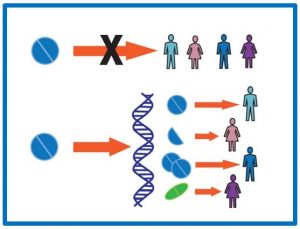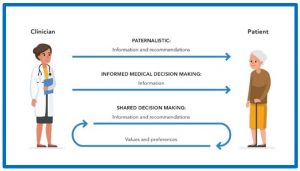Personalized medicine and shared decision making between HCPs and patients have increased in importance the last several years. Personalized or precision medicine is an emerging approach for disease treatment that takes into account variability in genes, environment, and lifestyle for each person as well as an individual’s preferences, comorbidities and experiences with meds. For the pharmaceutical industry, personalized medicine presents both challenges and opportunities as patients and HCPs are no longer settling for a one-size fits all method.
Challenges
Currently, patient support and education is lacking in many areas which hinders the ability of patients to actively participate in their healthcare decision-making process even though most want to be involved. In fact, about two-thirds (64%) of interstitial lung disease patients experience stress due to a lack of understanding about their disease.In addition, as a recent article in Nature noted, an estimated 90% of conventional and top-selling blockbuster medicines only work for 30% to 50% of patients. For some, these medications aren’t just ineffective but they also cause adverse reactions and side effects.

Therefore, market sizes for some meds may be reduced as medical advances and accumulated data allow us to determine which patients segments are likely to respond poorly to a drug. Patients may also become increasingly frustrated as they struggle to better understand expanding treatment options.
Opportunities
On the other hand, non-adherence to medication can be reduced when patients’ preferences and lifestyle are considered. Segmenting appropriate patients for targeted therapies can also produce better results and higher satisfaction. Lastly, there is a competitive edge opportunity for pharma companies who help bridge the communication gap between HCPs and patients for better shared decision making as the demand for personalized medicine increases. Outcome Health, a health information platform provider formerly called ContextMedia, says that compared to a control, for each dollar spent on a personalized digital interactive marketing campaign, brands are earning as much as $7 through an incremental lift on prescriptions filled. In terms of adherence, some are seeing a lift of more than 80% in continued prescriptions.
Personalized Medicine Requires Personalized Marketing
Pharma marketers must improve their personalized marketing to keep up with the personalized medicine movement. Besides market segmentation, pharma marketers should also increase focus on ways to improve communication between HCPs and patients for shared decision making.
For example, evidence shows that specialist nurses have a significant beneficial impact on personalized patient care, education, communication and adherence to treatment. Studies show that the support from frequent, patient-managed discussions with specialist nurses results in patients reporting higher satisfaction, “feeling in control”, “knowing what to expect from treatment”, and confidence about their disease management.

Pharma marketers, therefore, need to support nurses as many ways as they can including providing educational tools and resources. One example is patient decision aids designed to help patients understand and consider the pros and cons of possible treatment options and to encourage communication between HCPs and patients. They should be available to nurses, feature evidence based information, and contain images or diagrams where appropriate.
Providing apps and digital health technologies can also be a competitive edge. Apple announced an update to the Health app debuting a feature for customers to see their medical records right on their iPhone. Ultimately, "we're hoping to enable richer conversations between doctor and patient," said Sumbul Desai, Apple's digital health lead who's also a physician and medical researcher. One can easily conclude that the ability to pull up your own health record on an iPhone will only feed the desire for even more precision medicine and the demand for patients to have greater participation in treatment discussions. Decisions will increasingly be made as a much more collaborative effort between HCP interdisciplinary teams and patients. Pharma marketers should seize the opportunities created from this personalized medicine movement where HCPs and patients must find ways to bridge their communication gap for shared decision making.
Please subscribe to automatically receive a notice so that you don’t forget to read the next topic.
